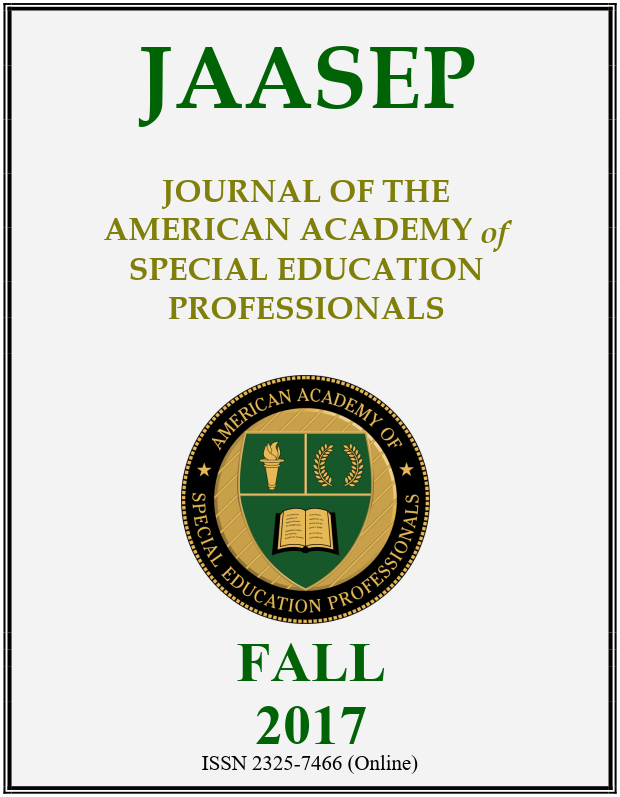Let’s Get Parents Ready for Their Initial IEP Meeting
Applequist, K. L. (2009). Parent perspectives of special education: Framing experiences for prospective special educators. Rural Special Education Quarterly, 28 (2), 3-16. DOI: https://doi.org/10.1177/875687050902800202
Bezdek, J., Summers, J. A., & Turnbull, A. (2010). Professionals’ attitudes on partnering with families of children and youth with disabilities. Education and Training in Autism and Developmental Disabilities, 45(3), 356 – 365.
Dabkowski, D. M. (2004). Encouraging active parent participation in IEP team meetings. TeachingExceptional Children, 36(3), 34-39. DOI: https://doi.org/10.1177/004005990403600304
Gay, L.R., Mills, G.E. & Airasian, P. (2006). Educational research: Competencies for analysis and applications (8th ed.). Upper Saddle River, NJ: Pearson.
Hammond, H., Ingalls, L. & Trussell, R. P. (2008). Family members’ involvement in the initial Individual education program (IEP) meeting and the IEP process: Perceptions and reactions. International Journal about Parents in Education,2(1), 35-48. DOI: https://doi.org/10.54195/ijpe.18154
Individuals with Disabilities Education Act, 20 U.S.C. § 1400 (2004).
Ingalls, L, Hammond, H, Paez, C, & Rodriguez, I. (2016). Follow-up study to family members’ reactions to the initial special education meeting. Accepted for publication in the Journal of the American Academy of Special Education Professionals Spring 2016 edition. DOI: https://doi.org/10.64546/jaasep.306
Kayama, Misa. (2010). Parental experiences of children’s disabilities and special education In the United States and Japan: Implications for school social work. Social Work,(55)2, 117 – 125. DOI: https://doi.org/10.1093/sw/55.2.117
Lo, L. (2012a). Preparing Chinese immigrant parents of children with disabilities to be school partners. In A. Honigsfeld & A. Cohan (Eds.), Breaking the mold of education for culturally and linguistically diverse students. Lanham, MD: R & L Education.
Lo, L. (2012b). Demystifying the IEP process for diverse parents of children with disabilities. Teaching Exceptional Children, 44(3), 14 – 20. DOI: https://doi.org/10.1177/004005991204400302
Lo, L. (2014). Readability of individualized education programs. Preventing School Failure, 58(2), 96 – 102.
Mueller, T.G., Milian, M., & Lopez, M.I. (2009). Latina mothers’ views of a parent-to-parent support group in the special education system. Research & Practice for Persons with Severe Disabilities, 34(3 – 4), 113 – 122. Individuals with Disabilities Education Act, 20 U.S.C. § 1400 (2004). “Question and Answers about IDEA: Parent Participation,” 2016. DOI: https://doi.org/10.2511/rpsd.34.3-4.113
Reiman, J. W., Beck, L., Coppola, T., & Engiles, A. (2010). Parents’ experiences with the IEP Process: Considerations for improving practice. CADRE Partners. Direction Service, Inc. The Individuals with Disabilities Education Improvement Act of 2004, Pub. L. 108-446, Section 601(c)(5).
Turnbull, A., Zuna, N., Hong, J.Y., Hu, X., Kyzar, K., Obremski, S., Summers, J.A. & Stowe, M. (2010). Knowledge-to-action guides for preparing families to be partners in making educational decisions. Teaching Exceptional Children, 42(3), 42-53. DOI: https://doi.org/10.1177/004005991004200305
Wright, K., Stegelin, D.A., & Hartle, L. (2007). Building family, school, and community partnerships (3rd ed.). Upper Saddle River, NJ: Pearson.
